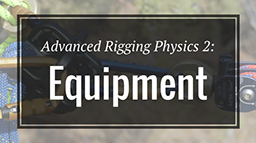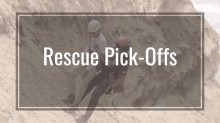We caught up with Pat Rhodes to find out what makes up the elements of rigging.
About the Course
Elements of Rigging — Knots and Hitches, Pulley Systems (and their rules), Anchors, Reeving Systems, Highlines, Resultants and Force Vectors. While it is true that “an element” by definition can no longer be broken down, I felt it necessary to keep things as simple as possible without getting into the minutia. There is an art to learning as well as science and hopefully we made the proper jumps from one to the other.
What You’ll Learn
Inside Elements of Rigging, we’ll cover topics such as:
Knots and hitches
Pulley systems and their rules
Anchors
Reeving systems & highlines
Resultants
Force vectors
And more!
Course Curriculum
Unit 1: Welcome
1.1 Video Tutorial: Elements of Rigging
1.2 Course Materials
1.3 Rope Rescue Course Text Manual
Unit 2: Knots
2.1 Video Tutorial: Elements of a Knot
2.2 Video Tutorial: Bowline Knots
2.3 Video Tutorial: Figure 8 Knots
Unit 3: Bombproof Anchors
3.1 Bombproof Anchors: Anchor Considerations in Rope Rigging Systems
3.2 Video Tutorial: Bombproof Anchors: Anchor Considerations in Rope Rigging Systems
Unit 4: Managing Friction
4.1 Video Tutorial: Managing Friction: Anchor Considerations in Rope Rigging Systems
4.2 Quiz: Managing Friction: Anchor Considerations in Rope Rigging Systems
Unit 5: Marginal Anchors
2.1 Video Tutorial: Marginal Anchors: Anchor Considerations in Rope Rigging Systems
Unit 6: Multi-Point Anchors
6.1 Video Tutorial: Multi-Point Anchors
Unit 7: Staggered Anchors & Mechanical Advantage
7.1 Video Tutorial: Staggered Anchors to Increase Mechanical Advantage
Unit 8: Critical Angles Specific to Highline Construction
8.1 Video Tutorial: Basic Rigging Physics Principles
8.2 Video Tutorial: Tension & Compression Study
8.3 Quiz: Anchor Considerations in Rope Rigging Systems
8.4 Video Tutorial: Aerial Ladders Use as an Artificial High Directional
8.5 Quiz: Aerial Ladders Use as an Artificial High Directional
Unit 9: Tripods-Portable Anchors and Confined Space Rescue Rigging
9.1 Video Tutorial: Understanding Resultants
9.2 Video Tutorial: Confined Space Rig
Unit 10: Special CSR Edition / Reeving Systems Within a Tripod or Other AHDs
10.1 Video Tutorial: Tripod English Reeve
10.2 Video Tutorial: Tripod English Reeve – Top Side
10.3 Video Tutorial: Tripod English Reeve – Haul Side
10.4 Tripod English Reeve – Double Pulley
10.5 Video Tutorial: Tripod English Reeve – Double Pulley
Unit 11: Special CSR Edition / Tripods – Portable Anchors & Confined Space Rescue Rigging
11.1 Video Tutorial: Portable Anchors – TerrAdaptor Tripod
11.2 Video Tutorial: Portable Anchors – Skedco Tripod
11.3 Video Tutorial: Video Tutorial: Rigging within a Tripod: Introduction to the 4:1 System
11.4 Video Tutorial: Tripods Principles of 4:1 Rescuer Lower Then Raise
11.5 Video Tutorial: 4:1 System Capture Prusik on the Top
11.6 Video Tutorial: 4:1 System Capture Prusik on the Bottom
11.7 Video Tutorial: 4:1 System – No Prusik Capture
11.8 Video Tutorial: Building a 4:1 System
11.9 Video Tutorial: Controlled Descent AHD with No Ground Anchors, Part 1
11.10 Video Tutorial: Control Descent AHD with No Ground Anchors, Part 2
11.11 Video Tutorial: Controlled Descent AHD with Ground Anchors
Unit 12: Special CSR Edition / Tripods-Portable Anchors and Confined Space Rescue Rigging
12.1 Video Tutorial: Split 4:1 Introduction
12.4 Video Tutorial: Split 4:1 Operations – Bottom Side
12.3 Video Tutorial: Split 4:1 Operations – Top Side
12.4 Video Tutorial: Drop Loop with Body Weight to Raise
12.5 Video Tutorial: Body Weight Anchor for Lower
12.6 Video Tutorial: Drop Loop with the ASAP on a Dog Leg
12.7 Video Tutorial: Non-Entry Rescue Set Up and 3:1 MA Using an Existing Lifeline
12.8 Video Tutorial: Non-Entry Rescue Raise Using a Stick Clip and Frame Mounted Winch
Unit 12: Wrap Up
13.1 Wrap Up
Added Perks
Additional features Rigging Lab Academy Members are enjoying
Certificate of Completion
Download your personalized Certificate of Completion after completing the course.
100% Self-Paced
Go through the course material as fast or as slow as you’d like.
Private Discussion Board
Ask questions, meet other students, and even chat with the course instructor.





